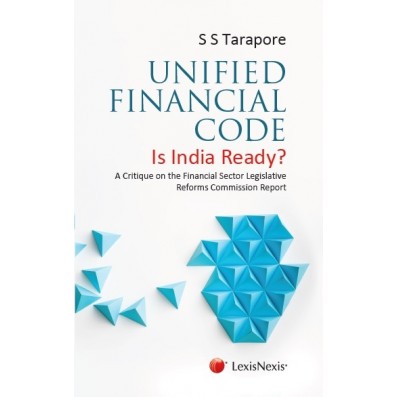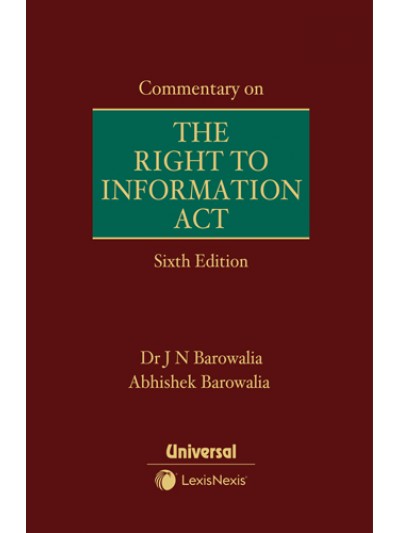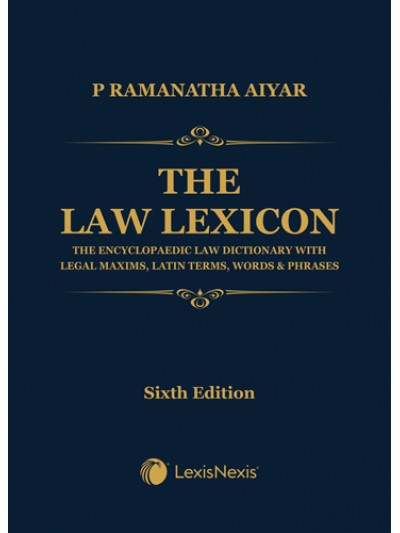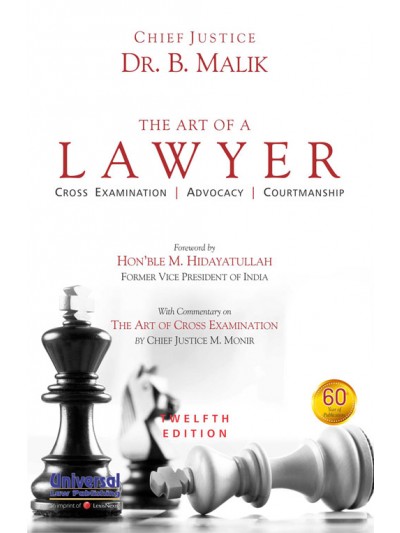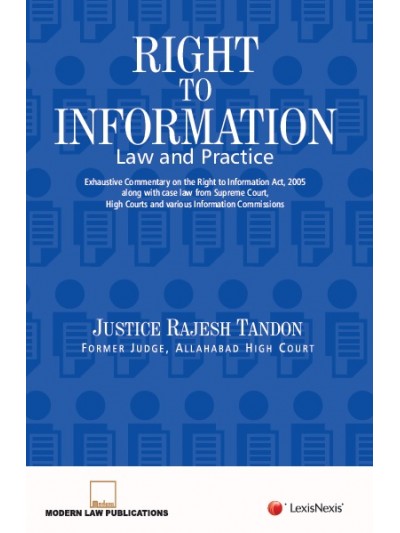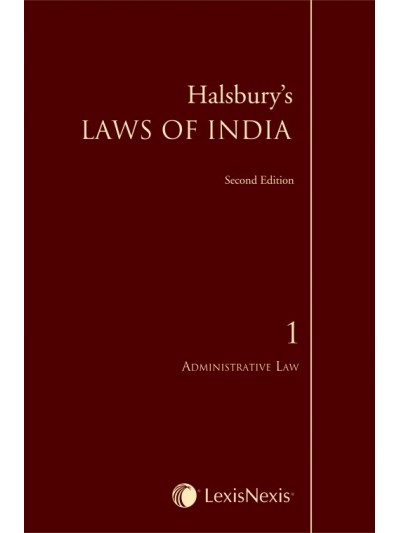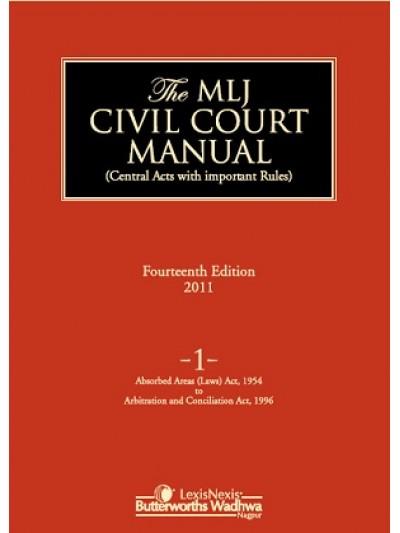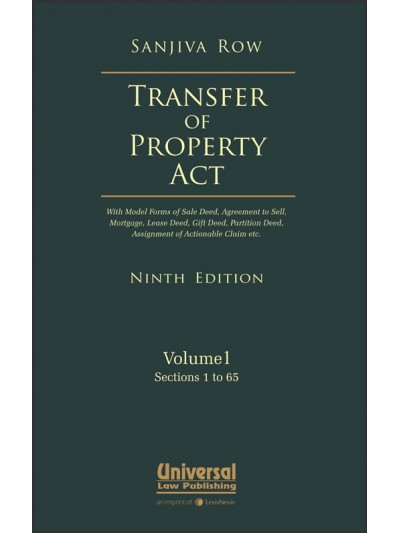Unified Financial Code– Is India Ready? A Critique on the Financial Sector Legislative Reforms Commission Report
Author : SS Tarapore
ISBN : 9789351435570
EDITION : 1st
NO. OF VOLUMES : 1
COPYRIGHT YEAR : 2015
⚠️ ALL PRINT ORDERS PLACED DURING 27th MARCH TO 10th APRIL WILL BE DISPATCHED POST 11th APRIL, 2025. SORRY FOR THE INCONVENIENCE CAUSED ⚠️
Author : SS Tarapore
ISBN : 9789351435570
EDITION : 1st
NO. OF VOLUMES : 1
BINDING : Hardcover
COPYRIGHT YEAR : 2015
This book debates India’s readiness to adopt a Single Unified Financial Code proposed by the Financial Sector Legislative Reforms Commission (FSLRC), which was set up in 2011 by the Ministry of Finance to review the existing financial legislative structure. It recommended a total overhaul of legislation regulating the financial sector in India. A compilation of 24 articles and 4 papers published in reputed newspapers and journals, this book examines the key issues and discusses the hazards of hasty implementation of the FSLRC’s proposals without building consensus amongst stakeholders. The book highlights the need for a detailed examination of the proposed changes by Parliament, financial experts, economists, lawmakers, policymakers, market players and academicians, before major legislative changes are enacted and enforced. TESTIMONIALS This slim volume is a compilation of writings by Savak Tarapore, an eminent central banking economist. The book focuses on issues addressed by the Financial Sector Legislative Reforms Commission. Tarapore rightly criticises the Commission’s recommendations which, if implemented, would weaken the regulatory framework and he stresses preconditions necessary for legislative changes. Moreover, he opposes diminishing the authority of the Governor and the functioning of the central bank. Tarapore’s words of wisdom are as timely as they are relevant. I commend the book to a wider readership. —M Narasimham Chairman Emeritus, Administrative Staff College of India, Hyderabad Former Finance Secretary, Government of India Tarapore offers through these essays a trenchant criticism of FSLRC Report. As always, he writes lucidly and with conviction. Notwithstanding my disagreement with several of his conclusions, I have no hesitation in saying that this book will play a key role in shaping future legislations governing India’s financial system. —C Rangarajan Former Chairman, Economic Advisory Council to the Prime Minster Former Governor, Reserve Bank of India Chairman, Madras School of Economics Savak Tarapore presents some well-argued cautionary criticism of some of the proposals made by the FSLRC in the name of financial sector reform. Tarapore has been a consistent supporter of financial sector reform but he also believes that reform proposals must be carefully considered. This is especially so when they involve the wholesale removal of an existing body of laws, which may well be flawed in some respects but are by now well understood and tested in Courts. The new legislation replacing them may well be better, but we will not know until it is tested in the Courts. Tarapore warns that the new proposals must be considered in great detail and with great care, more so than is normally done with new legislation. Everyone interested in the subject would do well to read this book very carefully. —Montek Singh Ahluwalia Former Deputy Chairman, Planning Commission This book is an eminently readable account of the hazards of the current thinking on Indian financial sector legislative reforms. The book is a must read for lawmakers, policymakers, market players, academicians and Parliamentarians. If I had to choose one book to read on the financial sector legislative reforms in India, it would be this slim volume. —Y V Reddy Former Governor, Reserve Bank of India
PLEASE READ THIS END USER LICENSE AGREEMENT (THIS "AGREEMENT") IN ITS ENTIRETY. BY CLICKING THE “NEXT” BUTTON, YOU ACKNOWLEDGE THAT (1) YOU HAVE READ AND UNDERSTOOD THIS AGREEMENT; (2) YOU ARE AUTHORIZED TO ACCEPT IT; AND (3) YOU AGREE TO ITS TERMS; IF YOU DO NOT ACCEPT THE TERMS CONTAINED HEREIN, CLICK THE “CANCEL” BUTTON BELOW.
YOU GRANT TO LN AND ITS AFFILIATES PERMISSION TO IDENTIFY YOU AS A SUBSCRIBER TO THE PUBLICATION SERVICES
This Licence Agreement is between LexisNexis, a division of RELX India Private Limited ("we” or “us") and the individual or institution to whom LexisNexis has agreed to supply the online and/or publication services and materials ("you" or "Subscriber") (and such license agreement, the “Agreement”). The following terms and conditions govern your use of the online services and/or publication services supplied by LexisNexis (the "Publication Services") and the materials and content available therein (including any third party websites or linked websites) ("Materials").
Other provisions that govern your use of the Publication Services and the Materials are set forth in the LexisNexis Terms of Trade (if applicable), your order form, any agreed addendum, online descriptions of files, online notices following file selection, and individual documents retrieved from the Publication Services (collectively the "Additional Terms"), all of which are incorporated by reference into this Agreement.
Using the commands of the Lexis KnowlEdge you and your Authorised Users may:
In addition to the rights to Materials listed above, and to the extent permitted by applicable copyright law, you and your Authorised Users may:
You and your Authorised Users may not:
Any password/ID number issued by us to an Authorised User is personal and confidential to that Authorised User. If we suspect that any password/ID is being used by an unauthorised user or a different Authorised User to the person to whom it was issued, that password/ID may be cancelled and you may be liable for additional charges, in accordance with our then current price list or catalogue for the applicable Publication Services or Materials, in respect of any such unauthorised use.
All right, title, and interest (including all copyrights and other intellectual property rights) in the Electronic Publications, Application Services and Materials, regardless of the form or medium, belong to LN or its third-party suppliers. You acquire no ownership of copyright or other intellectual property rights or proprietary interest in the, Electronic Publications, Application Services, or copies thereof, except the limited rights granted herein.
The following terms also apply to the Digital Library and Offline Reader Applications & Online Browser Access
You will respect and deploy the DRM settings on the, Electronic Publications as designated by LN that may restrict burning, copying, sharing or printing of the Electronic Publications In the event LN learns of attempts to circumvent such DRM protections either by you or your Authorised Users, LN shall in its sole discretion, be permitted to temporarily suspend and/or permanently terminate Authorised User's and/or your access to, Electronic Publications.
With respect to access to the Electronic Publications and Application Services, you agree that:
You may be restricted from accessing certain Materials otherwise available in the, Electronic Publications and Application Services based upon: (a) Materials you subscribe to; (b) Materials your Authorised Users are qualified to access; and (c) the specific program you subscribe to within the Electronic Publications
Materials and features of the Electronic Publications and Application Services may be added to, withdrawn from, or otherwise changed by LN without notice. In the event any such change results in the removal of a significant portion of the Electronic Publications and Application Services you will negotiate, in good faith, to make an appropriate adjustment to the amounts payable. If the parties are unable to agree upon an appropriate adjustment, then you may terminate this Agreement upon thirty (30) days prior written notice to LN and LN will grant you a pro-rata refund or credit (if either is applicable) for any fees or fixed charges you may have pre-paid. Not all eBooks or other Electronic Publications are available in all eBook or other electronic formats.
For access to the Digital Library, you will select from your organization a Digital Library Administrator to provide first level support to Authorised Users which includes user management, defining check out limit duration & check out limit of ebook titles at user level. LN Customer Support will provide second level support to your Digital Library Administrator(s) related to common user ID related issues, ebook title entitlements at institution level and is available at Tel: +91 12 4477 4477, Airtel: 1800-102-8177 (Toll Free), BSNL : 1800-180-7126 (Toll Free) from 9am-5pm IST (Mon-Fri) or customersupport.in@lexisnexis.com. Responses to your requests will be made within a commercially reasonable time period.
For the Digital Library, any supported internet browser may be used. However, full functionality may not be available if the most current version of a mainstream internet browser or the browser details as indicated on product website is not used.
You agree that access to Digital Library Publications and other Electronic Publications through the Application Services will be terminated upon expiration or termination of this Agreement.
A Covered Party (as defined below) shall not be liable for any loss, injury, claim, liability, or damage of any kind resulting in any way from: (a) any errors in or omissions from the Publication Services or any Materials available or not included therein; (b) the unavailability or interruption to the supply of the Publication Services or any features thereof or any Materials; (c) you or your Authorised User’s use or misuse of the Publication Services or Materials (regardless of whether you received any assistance from a Covered Party in using or misusing the Publication Services); (d) the loss or corruption of any data or equipment in connection with the Publication Services; (e) the content, accuracy, or completeness of Materials; (f) any delay or failure in performance beyond the reasonable control of a Covered Party; or (g) any content retrieved from the Internet even if retrieved or linked to from within the Publication Services, all regardless of whether you received assistance in the use of the Publication Services from a Covered Party.
“Covered Party” means: (a) LN, and any officer, director, employee, subcontractor, agent, successor, or assign of LN; and (b) each third-party supplier of Materials, third party alliance entities, their affiliates, and any officer, director, employee, subcontractor, agent, successor, or assign of any third-party supplier of Materials or any of their affiliates.
TO THE FULLEST EXTENT PERMITTED BY APPLICABLE LAW, UNDER NO CIRCUMSTANCES WILL THE AGGREGATE LIABILITY OF THE COVERED PARTIES IN CONNECTION WITH ANY CLAIM ARISING OUT OF OR RELATING TO THE PUBLICATION SERVICES OR MATERIALS OR THIS PUBLICATION SERVICES AGREEMENT EXCEED THE LESSER OF YOUR ACTUAL DIRECT DAMAGES OR THE AMOUNT YOU PAID FOR THE PUBLICATION SERVICES IN THE TWELVE-MONTH PERIOD IMMEDIATELY PRECEDING THE DATE THE CLAIM AROSE. YOUR RIGHT TO MONETARY DAMAGES IN THAT AMOUNT SHALL BE IN LIEU OF ALL OTHER REMEDIES WHICH YOU MAY HAVE AGAINST ANY COVERED PARTY WHETHER FOR BREACH OF THIS AGREEMENT OR IN TORT (INCLUDING NEGLIGENCE) OR FOR ANY OTHER COMMON LAW OR STATUTORY CAUSE OF ACTION.
TO THE FULLEST EXTENT PERMITTED BY LAW, NEITHER YOU NOR THE COVERED PARTIES SHALL BE LIABLE FOR ANY SPECIAL, INDIRECT, INCIDENTAL, PUNITIVE, CONSEQUENTIAL DAMAGES, OR FOR LOSS OF PROFITS, REVENUE, OR DATA, OR OF ANY KIND WHATSOEVER INCLUDING, WITHOUT LIMITATION, LEGAL FEES, IN ANY WAY DUE TO, RESULTING FROM, OR ARISING IN CONNECTION WITH THE PUBLICATION SERVICES, MATERIALS, OR THE FAILURE OF ANY COVERED PARTY TO PERFORM ITS OBLIGATIONS, REGARDLESS OF ANY NEGLIGENCE OF ANY COVERED PARTY. THE FOREGOING LIMITATION OF LIABILITY SHALL NOT APPLY TO A COVERED PARTY’S INDEMNITY OBLIGATIONS OR YOUR (AND YOUR AUTHORISED USERS’) INFRINGEMENT OF INTELLECTUAL PROPERTY OR MISAPPROPRIATION OF PROPRIETARY DATA BELONGING TO LN OR ITS THIRD-PARTY SUPPLIERS.
Notwithstanding anything to the contrary herein, if there is a breach of warranty in accordance with the immediately preceding paragraph, then LN, at its option and expense, will either defend you or indemnify and hold you harmless against proceedings or damages based on a third party’s claim of patent, trademark, service mark, copyright or trade secret infringement related to the use of the Publication Services or Materials, provided: (a) the third party claim was not caused by your improper use of the Publication Services or Materials; (b) you give LN prompt notice of such third party claim; (c) you give LN the sole right to control and direct the investigation, defense and settlement of such claim; and (d) you, at the expense of LN, reasonably cooperate with LN in connection with the foregoing.
If the Publication Services or the operation thereof become, or in the opinion of LN are likely to become, the subject of a claim of infringement, LN may, at its option and expense: (a) procure for you the right to continue using the Publication Services; (b) replace or modify the Publication Services so that they become non-infringing; or (c) terminate this Agreement on notice to you and grant you a refund or credit (if either is applicable) with respect to such Publication Services.
Notwithstanding any other provision in this Agreement, the remedies specified in the third, fifth and sixth paragraphs of this section shall constitute your sole and exclusive remedy for the respective matters specified therein.
The Publication Services and Materials are provided for reference purposes only and are neither intended, nor should they be used, as a substitute for professional advice or judgment or to provide legal advice with respect to particular circumstances. We do not undertake any obligation to consider whether the information provided to or by us for the purpose of our Publication Services and Materials (including answering a query) is either sufficient, up to date or appropriate for any particular or actual circumstances. We are not a law firm; we do not represent or advise clients in any matter and are not bound by the professional responsibilities and duties of a practising lawyer. Nothing in the Publication Services or the Materials or in the Agreement, nor any receipt or use of the Publication Services or the Materials, shall be construed or relied on as advertising or soliciting to provide any legal services, creating any solicitor-client relationship or providing any legal representation, advice or opinion whatsoever on behalf of us or our staff.
ublications will be offered as one-time licenses as perpetual access during the Term and the price for the one-time license does not include any or title (edition) Updates.
Additional pricing information:
If you: (a) breach this Agreement or otherwise infringe on any intellectual property rights granted herein; or (b) breach or otherwise fail to comply with any other obligation in this Agreement (including payment obligations), without prejudice to any other legal remedies available to LN under applicable law, LN may, without notice to you, suspend or terminate this Agreement. Without limiting the generality of the foregoing, if you fail to pay any sum properly due hereunder, LN reserves the right to seek enforcement of the full contract sum as well as to seek recovery of legal costs and other expenses incurred by LN in connection with your breach.
Change to Number of Authorised Users. In the event of a change in your organizational structure (i.e., mergers, acquisitions and divestitures), or there is organic growth within the organization, resulting in a significant change in the number of Authorised Users of the Publication Services and Materials, LN, in good faith, reserves the right to adjust the amounts payable under this Amendment to reflect the change in your use of the selected services. Any changes made by LN to the License Terms (as defined below) in accordance with this paragraph shall not be considered as changes made to the License Terms for the purposes of the next paragraph below.
License Terms. Effective upon notice to you, LN may add, modify or otherwise change any rights to, or restrictions on, the use of the Publication Service and Materials as the same are currently set forth in this Agreement (the “License Terms”). If LN exercises these rights, such changes will: (a) only be applied prospectively; and (b) not be specifically directed against you or your Authorised Users but will apply to all similarly situated LN customers using the Publication Services. If any changes made to the License Terms in accordance with this paragraph are unacceptable to you, you may terminate the Agreement and LN must receive your notice of termination within 30 days of the date of the change. Continued use of the Publication Services following the effective date of any change constitutes acceptance of the change.
Confidential Information. This Agreement and including any attachments such as any order form contain confidential information, including pricing information, of LN (the “Confidential Information”). You understand that disclosure of the Confidential Information may cause competitive harm to LN. You will receive and maintain the Confidential Information in trust and confidence and to take reasonable precautions against its disclosure to any third person.
Notices. Except as otherwise provided herein, all notices and other communications will be in writing or displayed electronically in the Publication Services by the provider thereof. Notices to you will be deemed as properly given on the date mailed, if mailed; on the date first made available, if displayed in the Publication Services; or on the date received, if delivered in any other manner. Notices to LN should be sent to your account representative with a copy sent to LexisNexis, Attention: Managing Director India, RE: Lexis Services, 14th Floor, Building No. 10, Tower B, DLF Cyber City, Phase-II, Gurgaon, Haryana, India, 122002.
Third Party Beneficiaries. Each third-party supplier of Materials has the right to assert and enforce these provisions directly on its own behalf as a third-party beneficiary. The failure of LN or any such third-party beneficiary to enforce any provision hereof will not constitute or be construed as a waiver of such provision or of the right to enforce it at a later time. Subject to the terms of this paragraph and the next paragraph, this Agreement does not confer any rights on any person or party other than the parties to this Agreement.
Assignments. You may not assign or sublicense this Agreement or your rights or obligations hereunder, directly or indirectly, without the prior written consent of LN, which consent shall not be unreasonably conditioned, delayed or withheld. LN may assign this Agreement to any successor to all or substantially all of the business or assets of LN that relate to the subject matter of this Agreement whether by asset or stock acquisitions, merger, consolidation or otherwise.
Successors and Permitted Assigns. Subject to the immediately preceding paragraph, this Agreement will inure to the benefit of and be binding upon the parties and their respective successors and permitted assigns.
Force Majeure. Non-performance of either party will be excused to the extent that performance is rendered impossible where failure to perform is a result of actions omissions or circumstances beyond the reasonable control of the non-performing party, such as fire, weather, civil disturbance, act of military or court or governmental authority, strike (provided such strike is not caused by that party’s employees), change in law or other governmental regulations or act of God.
Purchase Orders. No terms, provisions or conditions of any purchase order, acknowledgement or other business form that you may use in connection with this Agreement will have any effect on the rights, duties or obligations of the parties under, or otherwise modify, this Agreement, regardless of any failure by LN to object to such terms, provisions or conditions.
Governing Law and Arbitration. This Agreement shall be governed by and interpreted according to the laws of India regardless of the law that might apply under applicable principles of conflicts of law. Any dispute arising out of or in connection with this Agreement, including any question regarding its existence, validity or termination (each, a “Dispute”), shall be referred to the Delhi International Arbitration Centre and finally resolved by arbitration in accordance with the Delhi International Arbitration Centre (Arbitration Proceedings) Rules (the “DAC Rules”) for the time being in force, which rules are deemed to be incorporated by reference in this paragraph. The language of the arbitration shall be English. The seat of arbitration shall be New Delhi. The arbitral tribunal shall consist of a sole arbitrator appointed in accordance with the DAC Rules. The arbitrator so appointed: (i) shall be fluent in English; (ii) shall be a licensed and independent legal practitioner; and (iii) should, to the extent practicable, have experience in handling disputes arising out of agreements of this nature. The Parties hereby record their understanding and intent that, in an arbitration conducted in terms of this paragraph, each Party will bear its own expenses related to the arbitration and that administrative costs, miscellaneous expenses and arbitrator fees will be borne equally by the Parties, subject to the arbitral award. Where the arbitral award is for the payment of money, the sum for which the award is made shall include interest at the rate of two per cent higher than the current rate of interest (as defined in the Arbitration and Conciliation Act, 1996, as amended) prevalent on the date of award, for the period from the date on which the cause of action arose and up to the date on which the award is made.
Limitation of Action. You may not bring a claim of action, regardless of form, arising out of or related to amounts billed or payments made under your order form more than 12 months after LN first invoiced those amounts to you.
Order of Precedence. If there is a conflict between the terms and conditions of this Agreement, an order form, Additional Terms and any other document incorporated herein, the conflicting terms will be interpreted as narrowly as possible in the area of conflict and the conflict will be resolved by giving precedence in the following order: (a) the Additional Terms; (b) the terms of the order form; (c) the terms and conditions of this Agreement; and (d) the terms and conditions of any other document incorporated by reference herein.
Data and Privacy Laws.
If and to the extent that you or your Authorised Users provide personal data to LN for account registration or otherwise, the parties acknowledge that such information will be processed by LN in accordance with the data protection laws and the LexisNexis privacy policy applicable to the Publication Services and/or Materials at https://www.lexisnexis.com/global/privacy/privacy-policy.pageexcept where LN is processing such information on your behalf, the terms of the LexisNexis Data Processing Addendum at https://store.lexisnexis.in/website-and-product-terms-and-conditionswill apply.
If and to the extent that you transfer personal data to us in a territory outside the originating territory, the parties will be deemed to have entered into the LexisNexis Data Transfer Terms at https://store.lexisnexis.in/website-and-product-terms-and-conditions in respect of such transfer, whereby you are the “data exporter,” we are the “data importer,” the optional clauses are omitted, and the content of the applicable annexes corresponds to the respective content of the Agreement, unless the parties may rely on an alternative transfer mechanism or basis under the data protection laws.
Headings. The headings in the Agreement are for convenience only, and in no way affect the terms and conditions herein.
Amendments. Except in accordance with the second paragraph of this section, this Agreement may not be amended, except in writing signed by duly authorised representatives of both parties.
Waiver. The waiver by either party of breach or default or any provision under this Agreement shall be limited to the particular instance and does not constitute the waiver of any subsequent breach or default or any future waiver of such or any other provision. If anything in this Agreement is unenforceable, illegal or void then it is severed, and the rest of this Agreement remains in force and will be enforced to the maximum extent permissible by applicable law to affect the intent of the parties.
Trademarks. You grant to LN the limited right to use and display any trademarks, logos or service marks (collectively, “Subscriber Trademarks”) provided by you to LN for the express purpose of co-branding your customized adaptation of the Digital Library or White labeled/Co-branded site. LN shall not use the Subscriber Trademarks for any other purpose. You represent and warrant you own the Subscriber Trademarks or haves all necessary rights to grant this license to LN.
Credit Investigation. You hereby authorize LN to make whatever credit investigation LN deems appropriate in order to provide you with a Publication.
Entire Agreement. This Agreement and the order form constitute the entire agreement of the parties with respect to its subject matter and replaces and supersedes any prior written or verbal communications, representations, proposals or quotations on that subject matter.
Sanctions. You are neither identified on, nor shall you provide access to LN Services to any individuals or entities identified on, (1) OFAC’s list of Specially Designated Nationals (“SDN List”), (2) the UK’s HM Treasury’s Consolidated List of Sanctions Targets, (3) the EU’s Consolidated List of Persons, Groups, and Entities Subject to EU Financial Sanctions, (4) any other applicable sanctions lists, or (5) any person 50 percent or more owned, directly or indirectly, individually or in the aggregate by a person(s) identified in (1) through (4)
August 2021.
This Licence Agreement is between LexisNexis, a division of RELX India Private Limited ("we or us") and the individual or company to whom LexisNexis has agreed to supply the online and/or digital services and materials ("you" or "Subscriber"). The following terms and conditions govern your use of the online services and/or digital services (such as LexisNexis Red) supplied by LexisNexis (the "Services") and the materials and content available therein ("Materials").
Any dispute arising out of or in connection with these General Terms and Conditions and the Additional Terms, including any question regarding its existence, validity or termination (each, a “Dispute”), shall be referred to the Delhi International Arbitration Centre and finally resolved by arbitration in accordance with the Delhi International Arbitration Centre (Arbitration Proceedings) Rules (the “DAC Rules”) for the time being in force, which rules are deemed to be incorporated by reference in this clause. The language of the arbitration shall be English. The seat of arbitration shall be New Delhi. The arbitral tribunal shall consist of a sole arbitrator appointed in accordance with the DAC Rules. The arbitrator so appointed: (i) shall be fluent in English; (ii) shall be a licensed and independent legal practitioner; and (iii) should, to the extent practicable, have experience in handling disputes relating to the online information industry. The Parties hereby record their understanding and intent that, in an arbitration conducted in terms of this clause, each Party will bear its own expenses related to the arbitration and that administrative costs, miscellaneous expenses and arbitrator fees will be borne equally by the Parties, subject to the arbitral award. Where the arbitral award is for the payment of money, the sum for which the award is made shall include interest at the rate of two per cent higher than the current rate of interest (as defined in the Arbitration and Conciliation Act, 1996, as amended) prevalent on the date of award, for the period from the date on which the cause of action arose and up to the date on which the award is made.
Supplemental Terms

